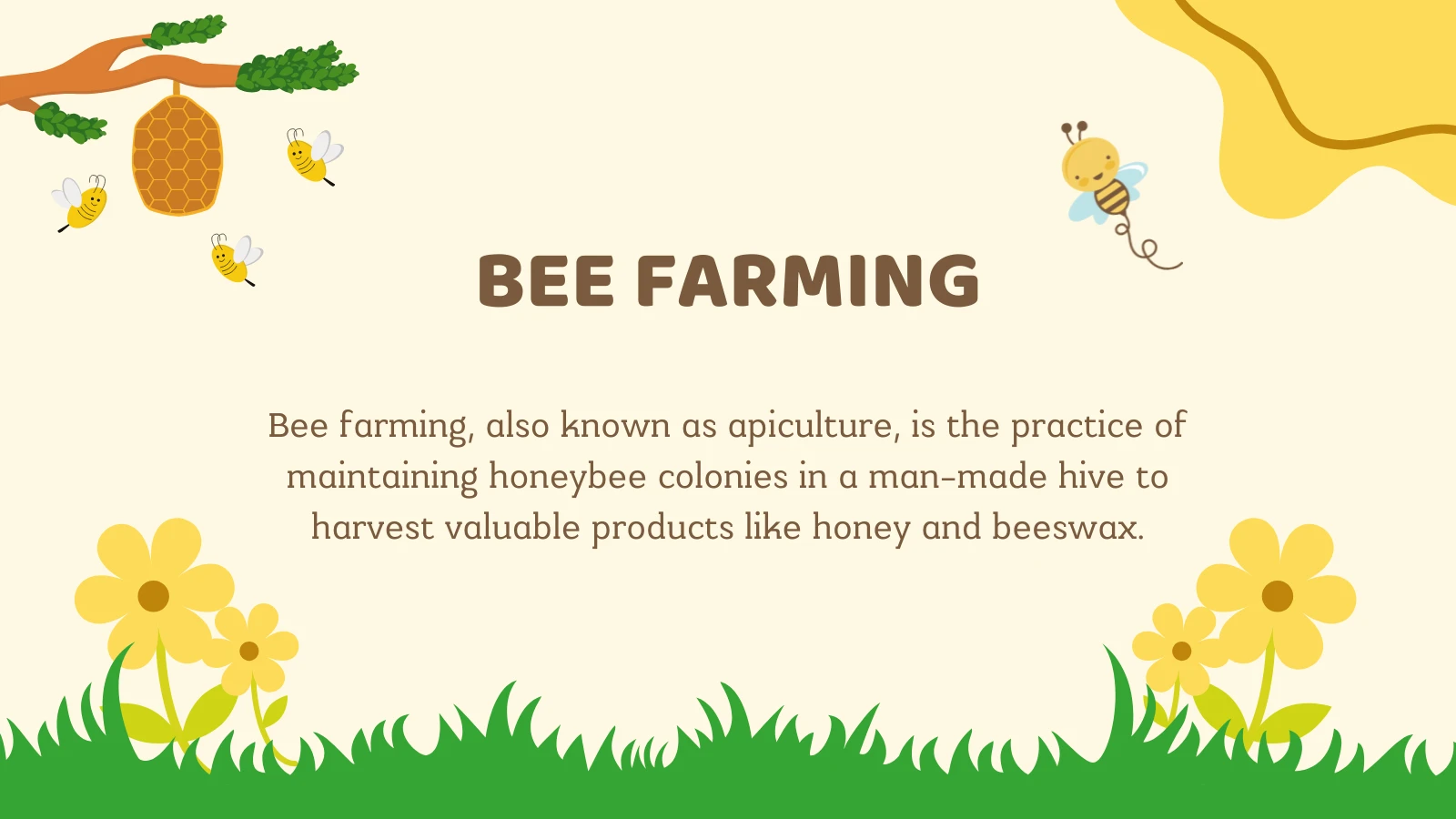Bee farming is the practice of maintaining honeybee colonies in a man-made hive to harvest valuable products like honey and beeswax. It is also known as apiculture, which is more than just producing honey. Bee farming plays a vital role in pollination, maintaining environmental balance, and supporting rural livelihoods. Let us see how bee farming works in India and why it is considered so important.
What is bee farming?
Bee farming is the practice of managing and raising honey bees for the production of honey and other bee-related products like beeswax, royal jelly, pollen, and propolis. It is said to support agriculture by helping in the pollination of the crops, which is an essential process that increases yields and biodiversity.
A normal bee farm contains a series of man-made hives that are just like the natural bee habitats. Farmers make sure to maintain the colonies of the bees and ensure a steady supply of nectar-producing plants nearby, which helps the bees to extract honey safely without harming themselves.
Bee Farming in India
The diverse flora and the climate of India make it an ideal place for bee farming, from the mustard fields of Haryana to the orchards of Himachal Pradesh, where bees tend to thrive in various ecosystems across the country. The Indian subcontinent is said to be the home of several native honeybee species, which are considered ideal for apiculture.
Common Honeybee Species in India
Here are some of the most common honeybee species that are found in India:
- Apis cerana indica: Commonly reared for local honey production.
- Apis Dorsata: Known as the giant rock bee, it produces large honeycombs in the wild.
- Apis mellifera: It is a European or Italian bee; it was introduced for commercial honey production.
- Trigona Iridipennis: The stingless bee species that produces high-quality medicinal honey.
The Honey Mission Project, which was promoted by the Khadi and Village Industries Commission (KVIC) and other government programs in order to support the rural beekeepers, offers training, subsidies, and tools. As of today, India is ranked among the world’s top honey producers and exporters, with Punjab, Haryana, West Bengal, Tamil Nadu, and Maharashtra leading the way.
Benefits of Bee Farming
Bee farming is about sustaining ecosystems and empowering communities. Here is how:
- Natural Pollination Boost: Bees are said to be nature’s best pollinators. Most of the apple crops rely on bees for fruit and seed production. Crops like mustard, sunflower, and almonds see a significant yield improvement when bees are present.
Income and Employment Generation: This proves to be an additional income source for the rural farmers. With very minimal investment, it can be united with the existing farms, which results in diversified income streams. - Production of Valuable Products: Many other products are provided by honeybees, except honey, like
- Beeswax
- Royal Jelly
- Pollen and Propolis
- Environmental Benefits: Bees tend to contribute to biodiversity conservation by cross-pollinating wild plants, which ensures ecosystem stability. It also helps to control the invasive species by promoting the growth of the native flora.
- Low Maintenance and High Return: Bees require less land, feed and care, so once the colony is established, it can yield honey and wax for many years, which makes bee farming both sustainable and profitable.
Also read: Hydroponic Farming: can it truly be organic?
Challenges in Bee Farming
There are many benefits of bee farming, but it also faces several challenges that threaten both the bees and the beekeepers:
- Pesticide Use: The use of chemical pesticides in excessive amounts tends to harm the bees, which results in the reduction of the population and affects pollination as well. Exposure to toxic chemicals causes colony collapse disorder, which is a phenomenon where the bees abandon their hives.
- Climate Change: India is known for its sudden climate change; you can never be prepared for irregular rainfall or sudden rises in temperature, which tend to disrupt the bee foraging and breeding cycles.
- Lack of Awareness and Training: There are many small-scale farmers who are unaware of the modern bee management techniques. Now the improper handling of hives can lead to reduced honey yields and colony losses.
- Predators and Diseases: Bees are very much susceptible to mites, wax moths, and bacterial infections. That’s why regular hive inspections are very important, as without this the colonies can quickly decline.
- Marketing and Price Fluctuations: The fluctuating prices of honey, along with the limited access to markets, can discourage many farmers from pursuing bee farming commercially.

